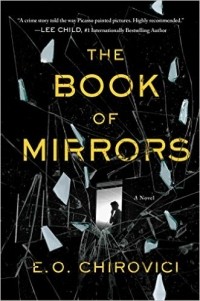Elmet by Fiona Mozley
 Friday, December 29, 2017 at 9:15AM
Friday, December 29, 2017 at 9:15AM 
First published in Great Britain in 2017; published by Algonquin Books on December 5, 2017
Elmet is a gut-wrenching story of a proud family living at the edge of society, fighting for their right to be left alone. The story is narrated by Daniel, a 15-year-old boy who knows little of his absent mother because Daniel’s father is silent about Daniel’s mother and most other things. Daniel’s bond with his father is strong but their communication has little to do with language.
Daniel’s father, John, is a bare-knuckle fighter, a man of almost mythical stature, the toughest man in England and Ireland. Daniel lives with his father and his older sister, Cathy, who learns to protect herself (and Daniel) with her fists, although her school did not approve of girls who fight back. John consequently took the kids out of school and moved away from their home town. Daniel’s father trusts Vivien, a neighbor, to teach the kids things that he can’t.
John lives an isolated life with his children, eschewing the company of neighbors. He talks little about his past, but he makes clear to his children that they are his world. He works hard to toughen them, to make them strong so they can withstand the hardship they will inevitably face.
Despite his isolation, John helps people in the surrounding villages and farms. His philosophy is, “You take care of people and it always comes good in the end.” To that end, John helps people in their protest against Price, the wealthy landowner who acts as the landlord for most of the people who live nearby. He also helps them stand up to the landowners who refuse to pay fair wages for the work done by those who farm their land.
Price owns the land on which John has built his family’s home. John will no longer do the dirty work requested by Price, so the family faces an uncertain future. Helping the powerless stand up to Price only makes the family’s future more precarious. The plot builds slowly to a conflict that can’t be resolved with fists alone.
Elmet’s theme involves the resentment that members of the working class (or the barely-working class) feel when land that was once community owned is deeded to rich landowners, who rent it to the same people who have always occupied it, while refusing to make improvements or repairs. Other themes spotlight the virtues of honesty and directness, and of standing up for principles even when the battle cannot be won.
Fiona Mozley’s graceful prose contrasts with the broken dialect of the novel’s main characters. Her observant descriptions of land and scenery create a rich atmosphere that connects the present to the past: “The soil was alive with ruptured stories that cascaded and rotted then found form once more and pushed up through the undergrowth and back into our lives.” The novel’s powerful ending is as unexpected as it is inevitable.
Elmet made the longlist for the 2017 Man Booker Prize. The winner, Lincoln in the Bardo, is another fine novel. Elmet is a more traditional example of storytelling. Both books tell a moving story, but I think I would give the edge to Elmet. In any event, they are both rewarding novels
RECOMMENDED


